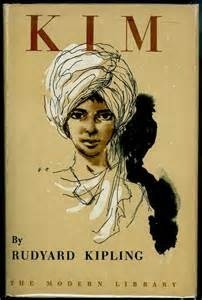Adventures with Words: Kim by Rudyard Kipling

Kim by Rudyard Kipling
It’s not obvious from my name, but half of my ancestry is from the Indian subcontinent. My father is Sri Lankan – Tamil on his father’s side and Sinhala on his mother’s – and while Sri Lanka, or Ceylon as it was then, is not India, there is a wide thread of common culture and attitudes uniting everyone from the subcontinent whatever their religion – and there are a lot of religions there. You might ask how I ended up with a surname like ‘Albert’ with such ancestry? The answer lies, in part, in the pages of this book: British imperialism and its impact upon the other peoples of the subcontinent, the lack of an answer derives from the prejudices of the people too. For the short answer is that my father does not really know. He was born in 1923 – and is still walking miles at 98! – but all he can tell me is that at some point before he was born, possibly his grandfather, took a British name, either from his employer or in honour of Prince Albert, Queen Victoria’s consort. The reason my father can’t tell me any more is that his parents’ marriage was a love match, made in the teeth of parental disapproval, since his father was Tamil (and Catholic) and his mother was Sinhala and quite a high-caste Buddhist (yes, I know that strictly speaking there should be no caste system among Sinhalese Buddhists but there is). His own grandparents disowned their children and the products of that marriage so that he only ever met his grandparents – on either side – once. That also meant he was cut off from much family history, and even more when his mother died when he was still quite young. There’s nothing equivalent to parish records in Sri Lanka, so on that side my family history cuts off with my father.
But I was brought up partly in and partly observing the culture of the subcontinent, and I recognise it. Which was why, when as a child I first started reading Rudyard Kipling’s stories, I recognised much that I knew. For this white, British imperialist was a better observer of, and more sympathetic to, the culture of the subcontinent than any other writer I knew at the time. Returning to his stories now, as a grown up, if anything I think he understood it, and portrayed it, even better than I thought when I first read them. Kim is a journey, on and around the Great Trunk Road, where the journey is really the point of the story, the journey and the people, all the chattering, laughing, thinking, talking people that make up the true richness of India. Kim is the story of a continent and the mark it left upon a young imperialist: India created Kipling and he was an honest enough writer to understand that. Kim is his thank you letter to India. It remains, to this day, possible the best novel about India ever written.
0 Comments